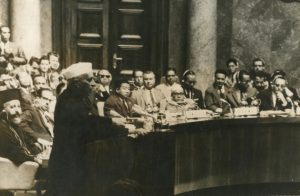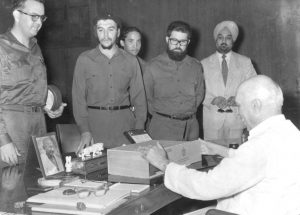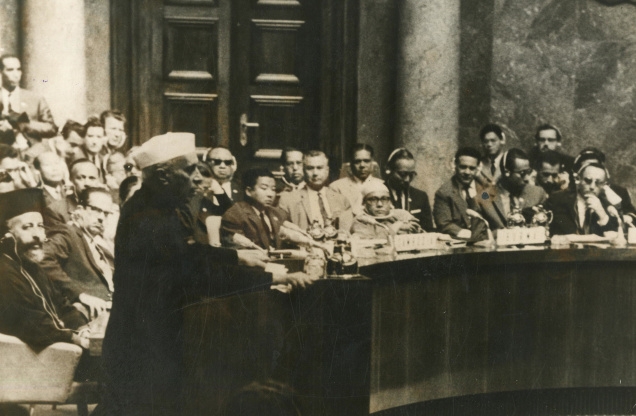The Middle Path
 Nehru’s pragmatic diplomacy gave a newly independent India a stature in world affairs much above its economic and military power and guided it deftly in a world being polarised by the Cold War
THE PEOPLE OF INDIA HAVE GOOD reason to be upset about the manner in which the 125th birth anniversary celebrations of Jawaharlal Nehru have begun, marked as they were by petty partisanship and unseemly attempts at settling of scores. Most people would have expected the political leadership to rise above inter-party differences and to unite and celebrate in a mature manner an anniversary of such national importance. Sixty-five per cent of Indians are under 35 years of age and for them it might have been rather puzzling that their elders should find it difficult to behave in a mature manner on an occasion like this.
A good part of the electronic media, with their debates where often more than one person speaks, or rather, the persons involved shout at each other with the anchor not able to enforce minimum courtesy levels, has only enhanced confusion in the minds of the viewers. Nehru, if he were to come back today, would have been appalled at the level of discourtesy displayed in such debates. He had a quick temper, but he was always courteous. Perhaps the debaters and anchors can consider paying a tribute to Nehru by taking a pledge to be courteous to each other from now onwards as their contribution to the ongoing celebration.
Nowadays, it is almost axiomatic that the foreign policy of a state is determined by its power, measured in terms of military, economic, and the soft variety, and that the state should always pursue its national interest as defined by the ruling elite without much regard to moral principles. Reflection will show that the real world is very different from the one imagined by the adherents of political realism. In the real world, the foreign policy of a state is determined by the interplay of various factors. The more important of such factors are: the historical setting; the power of the three varieties mentioned above; self-image; and the intentions and preferences of the state leadership.
[caption id="attachment_660" align="alignright" width="300" caption="July 1, 1959: Che Guevara (second from left), the charismatic revolutionary, gifts Nehru a box of Cuban cigars. Photo:The Hindu Archives"]
Nehru’s pragmatic diplomacy gave a newly independent India a stature in world affairs much above its economic and military power and guided it deftly in a world being polarised by the Cold War
THE PEOPLE OF INDIA HAVE GOOD reason to be upset about the manner in which the 125th birth anniversary celebrations of Jawaharlal Nehru have begun, marked as they were by petty partisanship and unseemly attempts at settling of scores. Most people would have expected the political leadership to rise above inter-party differences and to unite and celebrate in a mature manner an anniversary of such national importance. Sixty-five per cent of Indians are under 35 years of age and for them it might have been rather puzzling that their elders should find it difficult to behave in a mature manner on an occasion like this.
A good part of the electronic media, with their debates where often more than one person speaks, or rather, the persons involved shout at each other with the anchor not able to enforce minimum courtesy levels, has only enhanced confusion in the minds of the viewers. Nehru, if he were to come back today, would have been appalled at the level of discourtesy displayed in such debates. He had a quick temper, but he was always courteous. Perhaps the debaters and anchors can consider paying a tribute to Nehru by taking a pledge to be courteous to each other from now onwards as their contribution to the ongoing celebration.
Nowadays, it is almost axiomatic that the foreign policy of a state is determined by its power, measured in terms of military, economic, and the soft variety, and that the state should always pursue its national interest as defined by the ruling elite without much regard to moral principles. Reflection will show that the real world is very different from the one imagined by the adherents of political realism. In the real world, the foreign policy of a state is determined by the interplay of various factors. The more important of such factors are: the historical setting; the power of the three varieties mentioned above; self-image; and the intentions and preferences of the state leadership.
[caption id="attachment_660" align="alignright" width="300" caption="July 1, 1959: Che Guevara (second from left), the charismatic revolutionary, gifts Nehru a box of Cuban cigars. Photo:The Hindu Archives"] [/caption]
[/caption]
Cold War Origins
We start with the historical setting. By 1947, the Cold War had already set in. As the Preamble to the Constitution of UNESCO says, war begins in the minds of men. Even before Germany surrendered in May 1945, the policy planners in Washington had identified the Soviet Union as a potential and dangerous rival in the post-War world. President Franklin D. Roosevelt died in April 1945 and his successor, Harry S. Truman, had a visceral hatred for communism. In 1941, when Adolf Hitler invaded the Soviet Union, Truman had hoped that the two would fight each other to extinction. As the United States alone had the atomic bomb, Truman concluded that there was no need to work with the Soviet Union as his predecessor had done. In February 1946, Joseph Stalin said in an election speech that future wars between communism and capitalism were inevitable. The speech was read out of context in the U.S., where it was seen as a declaration of war by those who wanted to see it that way. In the same month, George Kennan in the U.S. Embassy in Moscow sent an 8,000-word telegram advocating “containment” of the Union of Soviet Socialist Republics (USSR). Next month, Winston Churchill, in a speech in Fulton, Missouri, warned of an Iron Curtain descending over Europe from Stettin in the Baltic to Trieste in the Adriatic. In April 1947, Bernard Baruch, the U.S. statesman, coined the term the Cold War. The West, led by the U.S., was convinced that it embodied all virtues and all that was good in human nature. It was also convinced that the USSR embodied all that was evil and that it posed a grave and imminent threat to “the free world”. There was no question of any country not joining the West in its crusade against communism and it was held that any one who hesitated lacked moral courage. Equally, the USSR too was fully convinced that it represented the triumphant wave of the future and that over time the rest of the world too would enjoy the benefits of communism. It could not understand why any state in the Third World would hesitate to join its bloc. The best description of the Cold War was given by Henry Kissinger, himself a protagonist: “The superpowers often behave like two heavily armed blind men feeling their way around a room, each believing himself in mortal peril from the other, whom he assumes to have perfect vision…. Of course, over time, even two blind men can do enormous harm to each other, not to speak of the room. Jawaharlal Nehru, with his sense of history, deep commitment to world peace, and sturdy sense of independence, decided not to follow either of the blind men. He wanted the blind to regain their sight. In 1949, on a visit to Washington, Nehru urged Truman to recognise the People’s Republic of China and to let it take its rightful place in the U.N., replacing Taiwan-based Republic of China. But Truman, under attack from Republicans for having “lost” China, would have found it difficult to accept Nehru’s advice even if, despite his irrational hatred for communism, he had wanted to do so. Two years later, when the Korean War was raging and the U.N. forces under General Douglas MacArthur were approaching the Yalu river that lies at the border between North Korea and China, Nehru conveyed a warning from China to the U.S. to halt the advance. The U.S. did not heed, China made a massive intervention and later, after the death of thousands of its soldiers, the U.S. agreed to a ceasefire along the 38th parallel, which was available when the warning by Nehru was conveyed. Some pundits in the U.S., and in India too, have argued that India had the option of aligning itself with the U.S. after the Second World War, deriving a number of advantages in the process. The argument does not stand historical scrutiny. As mentioned earlier, foreign policy is partly determined by preferences and intentions. In Truman’s world view, India did not figure prominently. Let us see how Truman saw India. The 1945 monsoon in India was weak and it was feared that there might be a famine in 1946. The then British Government of India sought food from the Combined Food Board consisting of the U.S., Canada, and the United Kingdom. There was no response even after Prime Minister Clement Attlee wrote to Truman supporting India’s case. Truman came out with a statement after receiving Attlee’s message, saying that the U.S. policy was to give preference to liberated peoples and to those who have fought beside it, but it would do its utmost “to prevent famine among former enemies”. The reader might wonder whether Truman knew that at the end of the Second World War India had the largest volunteer army in history, numbering 2.5 million, and that over 36,000 had died in the war. Truman refused to meet Sir Ramaswami Mudaliar, the leader of the Indian delegation to the meeting of the Combined Food Board till some pressure was put on him by the India Famine Emergency Committee. The meeting was brief and fruitless. One of the first letters Nehru wrote as Vice-President of the Interim government in September 1946 was to seek food aid from the U.S. Truman relented to give some food aid only in 1951 and that too because he wanted to get manganese, as the USSR stopped exporting it to the U.S. after the Korean War started. As regards the other superpower, Nehru had visited the Soviet Union in 1927 on invitation to celebrate the 10th anniversary of the Revolution. Though he knew that he was on a conducted tour, he was deeply impressed by “this strange Eurasian country of sickle and hammer, where workers and peasants sit on the thrones of the mighty and upset the best-laid schemes of mice and men”. However, Stalin was rather cold towards Nehru as he assumed charge of independent India, since, in Stalin’s eyes, India was not really free. India’s friendship with the Soviet Union really began only after Nikita Khrushchev took over and Nehru paid a visit to the Soviet Union in 1955, where he was given an exceptionally warm welcome. The return visit of Nikolai Bulganin and Khrushchev attracted a crowd of two million in Calcutta. India saw in the Soviet Union a reliable friend and a source of support over issues such as Goa and Kashmir. Nehru also recognised that when it came to decolonisation, the Soviet Union and India were on the same page. On the 1956 Hungarian crisis, Nehru took a rather soft line, partly because he was initially paying more attention to the Suez Crisis, which occurred almost at the same time. But, it should be added that it would have been imprudent to criticise the Soviet Union beyond a point as India needed its support on Kashmir. Allegations that Nehru was pro-Soviet to an extent that his non-alignment was compromised are unfounded. For Nehru, non-alignment was not a dogma to be adhered to in toto under any circumstances. He was pragmatic. Though India was militarily and economically weak, with the pejorative “Hindu rate of growth” of its economy, Nehru played an important role in the global arena. That role is in some contrast with the non-role of his successors even as India’s economic and military strength grew manifold. When Nehru spoke, the world listened with attention. His was a voice speaking not only on behalf of India, but also of the non-aligned world. Even before Independence, Nehru convened the Asian Relations Conference in March-April 1947. At this conference, Nehru declared: “...Asia is again finding herself. ...one of the notable consequences of the European domination of Asia has been the isolation of the countries of Asia from one another. ...Today this isolation is breaking down because of many reasons, political and otherwise. ...This Conference is significant as an expression of that deeper urge of the mind and spirit of Asia which has persisted... In this Conference and in this work there are no leaders and no followers. All countries of Asia have to meet together in a common task.”For decolonisation
Nehru was a passionate advocate of decolonisation. He believed that India’s freedom was incomplete till others too got freedom. In 1949, he convened a conference in Delhi to lend support to Indonesia’s struggle for freedom from the Dutch. In the U.N., India took a leading role to accelerate the decolonisation process. In 1946, the U.N. had only 36 members, but, by 1970, it had gone up to 127, marking the success of decolonisation. In this context, India’s successful struggle against Apartheid in South Africa needs to be noted. Gandhi had started the fight for the dignity of the Indians in South Africa and Nehru took it to its logical conclusion. India raised the matter of Apartheid in the U.N. and led the debate till 1957 when India requested independent Ghana to take over the lead. Nehru was actively engaged in conflict resolution. Whether it was the impasse over the repatriation of the prisoners of war in Korea, the deadlocked conference on Indo-China in Geneva (1954), or the Suez Crisis (1956), Nehru, through V.K. Krishna Menon, brought reconciliation among positions that appeared irreconcilable. Indeed, one misses that type of active diplomacy from India now.On China, Nehru’s policy met with disaster, but it is important to view in perspective the 1962 war. As Mao Zedong told a visiting Nepalese delegation in 1964, the major problem between India and China was not the McMahon Line but the Tibet question. Without evidence, Mao had concluded that India was behind the 1959 disturbances in Tibet and Nehru’s decision to grant asylum to Dalai Lama was resented by Mao, who wanted “to teach Nehru a lesson”. However, in hindsight, it is clear that India could have handled China in a better way. If a correct assessment of China’s intentions had been made, appropriate measures could have been taken to build up India’s defence strength with foreign assistance as needed. Some have criticised Nehru for seeking U.S. military assistance as it was a deviation from non-alignment. The critics forget that one has to survive first before deciding to be aligned or non-aligned. In fact, Nehru should be complimented for taking appropriate action without being inhibited by the scruples of non-alignment.

